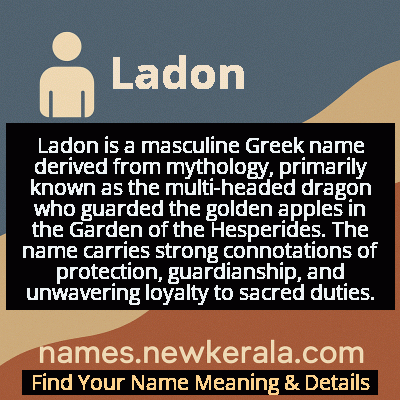Ladon Name Meaning & Details
Origin, Popularity, Numerology Analysis & Name Meaning of Ladon
Discover the origin, meaning, and cultural significance of the name LADON. Delve into its historical roots and explore the lasting impact it has had on communities and traditions.
Name
Ladon
Gender
Male
Origin
Greek
Lucky Number
1
Meaning of the Name - Ladon
Ladon is a masculine Greek name derived from mythology, primarily known as the multi-headed dragon who guarded the golden apples in the Garden of the Hesperides. The name carries strong connotations of protection, guardianship, and unwavering loyalty to sacred duties.
Ladon - Complete Numerology Analysis
Your Numerology Number
Based on Pythagorean Numerology System
Ruling Planet
Sun
Positive Nature
Leaders, ambitious, highly driven, self-reliant, innovative.
Negative Traits
Overly aggressive, domineering, impatient, selfish.
Lucky Colours
Red, orange, gold.
Lucky Days
Sunday.
Lucky Stones
Ruby, garnet.
Harmony Numbers
2, 3, 9.
Best Suited Professions
Entrepreneurs, managers, engineers.
What People Like About You
Courage, determination, leadership.
Famous People Named Ladon
Ladon of Rhodes
Ancient Olympic Runner
Won the stadion race in the 99th Olympic Games (384 BCE)
Ladon (mythological figure)
River God
Father of Daphne and Metope in Arcadian mythology
Ladon (dragon)
Mythological Guardian
Immortal dragon who guarded the golden apples in the Garden of the Hesperides
Name Variations & International Equivalents
Click on blue names to explore their detailed meanings. Gray names with will be available soon.
Cultural & Historical Significance
Beyond his draconic form, Ladon also appears as an Arcadian river god, father of the nymph Daphne who was transformed into the first laurel tree. This dual nature reflects the complex Greek understanding of natural forces—both destructive and life-giving. The river Ladon was renowned in antiquity for its clear, beautiful waters, and the mythological figure embodied the nurturing aspects of water sources while the dragon represented protective, formidable natural forces. This combination of characteristics made Ladon a multifaceted symbol in Greek thought, representing both the dangers and blessings of the natural world, and the necessary boundaries that protect sacred spaces from mortal intrusion.
Extended Personality Analysis
Individuals bearing the name Ladon typically exhibit strong protective instincts and unwavering loyalty, mirroring the mythological dragon's dedication to his sacred duty. They often possess a natural authority and determination that makes them effective guardians of people, principles, or projects they care about. Their protective nature is not merely defensive but proactive—they anticipate threats and prepare accordingly, much like the ever-vigilant dragon of myth. This can manifest as careful planning, attention to detail, and a comprehensive approach to problem-solving that considers multiple perspectives simultaneously, reflecting Ladon's hundred-headed awareness.
At the same time, the river god aspect of Ladon's mythology suggests a more fluid, creative dimension to their personality. They may possess deep emotional currents and the ability to nurture growth in others, combining strength with sensitivity. This duality allows them to be both formidable protectors and compassionate supporters. However, they may struggle with finding balance between their protective instincts and allowing necessary freedom, sometimes becoming overly rigid in their guardianship. Their strength lies in their reliability and dedication, but they must learn when protection becomes restriction. The combination of dragon and river symbolism creates individuals who are both strong boundaries and life-giving sources—people who defend what matters while nourishing what they protect.
Modern Usage & Popularity
In contemporary naming practices, Ladon remains an exceptionally rare choice that appeals primarily to parents with specific interests in Greek mythology or those seeking distinctive classical names with strong masculine connotations. Its usage is most consistent within Greece and Greek communities abroad, where it maintains its cultural authenticity, though it occasionally appears internationally among classical scholars and mythology enthusiasts. The name has never appeared on mainstream baby name charts in English-speaking countries, preserving its unique status. Recent years have seen a growing interest in mythological names, which may gradually increase Ladon's visibility, though it's unlikely to become common. The name's strongest appeal lies in its combination of historical depth, strong protective symbolism, and distinctive sound that sets it apart from more conventional classical names. Parents choosing Ladon typically value its mythological heritage and the qualities of loyalty, protection, and strength it represents.
Symbolic & Spiritual Meanings
Symbolically, Ladon embodies the complex interplay between protection and limitation, representing both the safety of boundaries and the restrictions they impose. As the dragon guardian of the golden apples, he symbolizes sacred duty, unwavering vigilance, and the defense of valuable treasures—whether material, spiritual, or intellectual. His multiple heads represent comprehensive awareness, the ability to perceive from multiple perspectives simultaneously, and the integration of diverse knowledge into a unified protective system. The golden apples themselves add layers of symbolism including divine favor, immortality, and forbidden knowledge that must be protected from unworthy hands. In his river god aspect, Ladon represents the life-sustaining flow of water, emotional depth, creative currents, and the nurturing power of nature. This duality makes him a symbol of both formidable defense and life-giving sustenance—the necessary boundaries that protect valuable resources and the flowing generosity that shares them appropriately. The name ultimately represents the balance between protecting what is sacred and knowing when to allow access to life's treasures.

